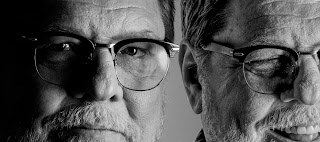A: This is a wonderful question in that it runs my mind down multiple tracks of thought. I call myself a crime writer, and yet I’m not sure I believe in genre except as a way to organize bookstore shelves.
Gary Phillips One-Shot Harry is clearly a crime book, and it is equally a historical novel about race, civil rights, politics and the police in 1963 Los Angeles. It is also a fine and wonderful novel.
Naomi Hirahara’s Clark and Division is crime fiction, and it is a historical novel depicting Japanese Americans who, when released from mass incarceration were sent to live in Chicago. It can be read and enjoyed as a mystery, but the facts and history lessons buried in it are unavoidable. And this is where genre lets us down, no good book is just one thing, or even two for that matter.
Is Steinbeck’s reworking of Arthurian legends in Tortilla Flat a crime novel? Danny and his mates commit crimes, they are in and out of jail. The story without the writer’s voice could be noir. Crime novel or character study or…?
Is To Kill A Mocking Bird a crime novel, legal thriller, or a coming of age novel? It has elements of all of these, as does any great book regardless of the genre we place it in.
SUB GENRES:
Inside crime writing we have Traditional, Hard Boiled, Noir, Cozy, Detective, Police Procedural, Spy, Heist, etc…. That’s before we get to thrillers and all its hyphenates. (I’m sure I’ve left many out.)
I think of crime fiction like the blues. John Lee Hooker, Muddy Waters, BB King, and Mississippi John Hurt all work within the same 12 bars, 3 chords, 6 notes constraint. And yet they each express their own voice inside it. Chicago Blues and Delta Blues have less in common than Agatha Christie and Raymond Chandler yet they are in the same section of iTunes. And even with the simplicity of the blues, these artists spent their lives exploring those 12 bars.
So far everything I’ve written fits into crime fiction, but I have danced in multiple sub-genres. The Moses McGuire trilogy was spot on hard boiled. Then I wrote a memoir. Then a disco heist novel.
With Tricky I wanted to write about a good cop like my grand father had been. I also needed to speak to how intellectually disabled people are treated by the police. Katrina Niidas Holm at Mystery Scene Magazine wrote, “Stallings manages to entertain while advocating for criminal justice reform and calling out unexamined societal biases.” Which sounds like a social justice crime novel, yet it is categorized as a police procedural.
I start every new book with a wisp of an idea so ephemeral that anything as solid as genre would blow it away. This is totally true, until it isn’t. Coming off the Moses books I was beat. Looking for a new idea I thought about writing a story harkening back to my misspent youth as a glitter kid in the ‘70s. The words, “Disco Heist” came to me. Hadn’t a clue what it meant except that heist was a sub genre. Excluding Young Americans, I wait until the book is done and with the help of my agent and editor we discover a marketing approach, part of that will be discovering the best genre to place it in.
And there it is, I just stumbled onto why I don’t think of genre when working; trying to decide how to sell a car before you even know if will have wheels or wings, or could be a boat, doesn’t help me as a writer. (Side note, genre also doesn’t help me as a reader.)
Back to the question, are their other genres I might try out? Sure. I am enamored with Emily St. John Mandel’s work. I would love to write a post-apocalyptic tale like her Station Eleven. The way she drifts through time and place with a powerful emotional through line is stunning. I’ve also had a western kicking around my head for a while… We’ll have to see if either of these climb their way to the top of my to-be-written pile.
My current work in progress may not have any crime in it. I pitched my agent a rough outline. Added, “Bad news, it may not be crime fiction.” She told me it didn’t matter, just pour my heart into it. And that’s what I’ll do. Pour my heart on the page and let marketing figure out this genre deal.










